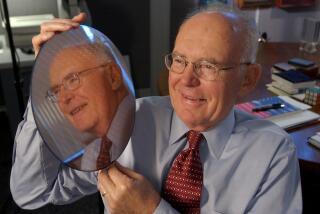Microchips Over Matter
- Share via
Re “Chips, Lacking the Design Flaws of Brains, Will Lift Minds From Here to Eternity,” Commentary, July 9: Bart Kosko believes we shouldn’t try to make robots with artificial intelligence because that’s too hard; instead, we should use computer chips to help flawed human brains think with almost godlike powers.
Implanting tiny chips, data, algorithms and programs in your head will not, as Kosko contends, boost cognitive function one bit, if by that we mean “thinking.” Being able to access “all knowledge and all databases at the speed of light” is a little like being able to park a teeny-tiny version of the Library of Congress inside your skull. Then what? Not much. Lots of data, even if access to it could be wired in the brain, skipping the display screen, does not impart “bit-based omniscience,” in Kosko’s Promethean phrase. You’d have to think about it with that flawed brain.
But the wiring is a problem. Wiring chips to brains would somehow have to plug data-bit supply lines to living, conscious content receptors. (Where are they? Where’s the schematic? Where is that screen, after all?) Here the electrical engineer would surely have to collaborate with the neurosurgeon, but where does the thought guy, the conceptualist technician, come in?
Words and data are unconscious themselves and do not constitute knowledge. “It’s 72 degrees and overcast” is a piece of information--just that and not understanding. You’re no wiser for knowing that, unless you have something you want to do with it, some question to ponder, some hypothesis to test or issue to argue.
Robert Chianese
Professor of English
CSU, Northridge
*
I am familiar with Moore’s Law and agree that, so far, it has been accurate, but I question that it is a “law” like other laws of physics. It is not clear that it’s applicable when we get down to building circuits approaching the width of an atom. Has it been shown that a chip the size of a large house would be big enough to equal the processing power of a human brain? But even if we assume that all this is correct and doable, the prospect that our brains’ destiny is chip-based rather than biologically based is haunting. It is precisely that “three pounds of meat” that makes us human.
Mr. Kosko, I hereby volunteer to let you have my place in line for your perfect robotic brain. In fact, to show you that my heart is in the right place, I will even reboot you when you freeze up.
Mark D. Kale
Encino
*
Kosko has a goofy idea that within 20 or so years we humans will begin implanting computer chips in our brains, making us smarter, faster, better until at last we reach a state of God-like omniscience. Oh, please! We haven’t even invented the cure for the common cold, a solution to the San Diego Freeway’s daily traffic jams or a really good carpet cleaner, let alone tackled the really big problems: global warming, systemic poverty, the energy crisis, George W. Bush’s administration.
True, maybe my inherent design flaws limit my imagination, but maybe Kosko should be writing science fiction instead of opinion pieces.
Jennifer Flowers
Laguna Beach






